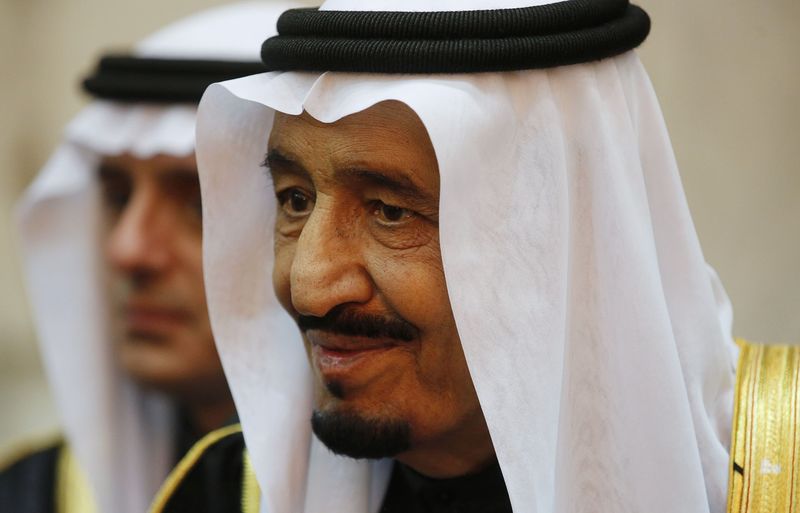By William Maclean and Angus McDowall
DUBAI/RIYADH (Reuters) - The Saudi king's absence from a regional summit to be hosted by President Barack Obama shows how Gulf states, displeased by what they see as U.S. indifference to Iranian meddling in the Arab world, may hesitate to bless any nuclear deal with Tehran.
Analysts and diplomats in the Middle East described King Salman's decision to skip the meeting at Camp David this week as a snub, despite denials from U.S. officials as well as Riyadh's new foreign minister and other Saudi insiders.
Riyadh announced the monarch's no-show on Sunday, only two days after the White House had said he would attend the summit of Gulf Cooperation Council (GCC) states - some of which have long doubted Obama's commitment to confronting Iranian backing of Shi'ite Muslim militias across the region.
Crown Prince Mohammed bin Nayef, who has strong ties with the U.S. political and security establishment, will represent Saudi Arabia at the May 13-14 gathering along with Deputy Crown Prince Mohammed bin Salman, the king's son who serves as the defence minister. Since Salman took power in January, the pair have determined most aspects of Saudi policy.
The Saudi government said one of the main reasons Salman was skipping the summit was because it overlapped with a five-day humanitarian ceasefire in neighbouring Yemen, where a Saudi-led coalition is waging a bombing campaign against Iran-allied Houthi rebels.
The leading Gulf Arab power has complained for years that Washington does not take its concerns seriously. It thinks a focus on settling the dispute over Tehran's nuclear programme has distracted the United States from more urgent problems.
Secretary of State John Kerry has tried to reassure the Gulf states that Washington will not accept a bad nuclear deal, saying the Camp David discussions would flesh out commitments that will create "a new security understanding" with the GCC.
Washington is also poised to offer new weapons under a push for a GCC-shared missile defence system, senior U.S. officials said last week.
"The conspiracy theorists of old have been proven right. The U.S. creates threats for us and then offers us more weapons systems. That does not bode well for us," said Sami Alfaraj, a Kuwaiti security adviser to the six-nation GCC.
Riyadh believes Iranian support for militias in Lebanon, Syria, Iraq and Yemen is the biggest cause of regional instability, aggravating sectarian tensions, undermining strong government and boosting Sunni Muslim jihadists.
The Saudis fear Obama sees a settlement between world powers and Tehran as his legacy. Such a deal on the nuclear programme - which the West believes may be aimed at building weapons despite Iranian denials - could lift international sanctions without taming the country's regional ambitions, they think.
Backing from the GCC - made up of Saudi Arabia, Kuwait, Qatar, Bahrain, the United Arab Emirates (UAE) and Oman - is important for Obama to show Congress that the Iran deal has broad regional support, despite Israeli opposition.
Salman expressed guarded support for a framework nuclear agreement reached last month, but insists any accord must be robust, verifiable and no threat to Tehran's neighbours.
NEW WEAPONS
Salman is not the only GCC leader skipping the summit. Of the six GCC states, only two - Kuwait and Qatar - will be represented by their ruling monarchs.
White House spokesman Josh Earnest said Saudi Arabia
did not raise any concerns about the summit agenda before or after the Saudi king decided not to come, and that Washington was confident that the Gulf officials in attendance would be able to represent their countries and implement any decisions.
"This idea that this is a snub because the King did not attend is really off-base," Saudi Foreign Minister Adel al-Jubeir told reporters in Washington. He insisted it was not related to any disagreements between the two countries.
Obama's support for the Yemen campaign, despite strategic and humanitarian reservations, has signalled American commitment to Riyadh's security but may not have won over the Saudis.
"Their experience of six years from Obama is assurances, promises, nice words. But at the end of the day they got nothing in their hands," said Mustafa Alani, an Iraqi security analyst with close ties to the Saudi crown prince's Interior Ministry.
He said Riyadh regarded U.S. support for the Yemen campaign as a quid pro quo for Saudi blessing of an Iran deal, which major powers and Tehran are aiming to complete by June.
But Abdulkhaleq Abdulla, a political scientist in the UAE, underlined the regional doubts. "We still think deeply that Iran is a destabilising force and with the nuclear deal it is going to be even more destabilising. So I think fundamentally we - the GCC and the U.S - are not on the same page anymore," he said.
Some diplomats in the region believe the absence from Camp David of King Salman and close ally King Hamad of Bahrain, host of the U.S. Fifth Fleet, may backfire.
A Saudi decision in 2013 to vacate a seat on the United Nations Security Council that it had spent years seeking, followed by a leak of angry comments about Washington by then spy chief Prince Bandar bin Sultan, failed to change U.S. policy.

"Of course it (Salman's non-appearance) is a snub. But I don't think Obama is going to put up with this. He wants the nuclear deal. It is the number one priority," said a Western diplomat based in the region.